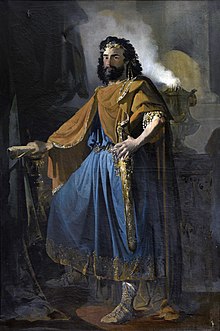Euric
| Euric | |
|---|---|
| King of theVisigoths | |
 Imaginary portrait of Euric by Manuel Rodríguez de Guzmán. Oil on canvas (1855) | |
| Reign | 466 – 28 December 484 |
| Predecessor | Theodoric II |
| Successor | Alaric II |
| Born | c. 420 |
| Died | 28 December 484(aged 63–64) |
| Spouse | Ragnagild |
| Issue | Alaric II |
| Dynasty | Balt |
| Father | Theodoric I |
| Religion | Arianism |
Euric(Gothic:𐌰𐌹𐍅𐌰𐍂𐌴𐌹𐌺𐍃,Aiwareiks,seeEric), also known asEvaric(c. 420[1]– 28 December 484), son ofTheodoric I,ruled as king (rex) of theVisigoths,after murdering his brother,Theodoric II,[2]from 466 until his death in 484. Sometimes he is called Euric II.
Reign
[edit]With his capital atToulouse,Euric inherited a large portion of the Visigothic possessions in theAquitaineregion ofGaul,an area that had been under Visigothic control since 415. Over the decades the Visigoths had gradually expanded their holdings at the expense of the weak Roman government, including Euric's sieges of Clermont in 475 and 476,[3]as well as advancing well intoHispaniain the process.
Upon becoming king, Euric defeated several other Visigothic kings and chieftains in a series of civil wars and soon became the first ruler of a truly unified Visigothic nation. Taking advantage of the Romans' problems, he extended Visigothic power in Hispania, driving theSueviinto the northwest of Iberia. By the time theWestern Roman Empireended in 476 he controlled nearly the entireIberian peninsula.
In 469 or 470 Euric defeated theBritish kingRiothamusatDéolsand expanded his kingdom even further north, possibly as far as theLoire River,themarchofSyagriusterritory. During what has become known as theBattle of Arles (471),near Arelate, presentlyArles,Euric defeated a Roman army, killing three Roman counts andAnthemiolus,son of the Roman emperorAnthemius.
Previous Visigothic kings had officially ruled only as legates of the Roman emperor but Euric was the first to declare his complete independence from the puppet emperors. In 475 he forced the Western EmperorJulius Neposto recognize his full independence instead of the status offoederatiin exchange for the return of theProvenceregion of Gaul. The Roman citizens of Hispania then pledged their allegiance to Euric, recognizing him as their king. In the same yearClermont(-Ferrand)surrendered to him after a long siege, and its bishop,Sidonius Apollinaris,sued for peace.
Euric was one of the more learned of the great Visigothic kings and was the first one to formally codify his people's laws. TheCode of Euricprobably issued around 476[4]codified the traditional laws that had been entrusted to the memory of designated specialists who had learned each article by heart. He employed many Gallo-Roman nobles in his court such as Leo of Narbonne.
At Euric's death of natural causes in 484 the Kingdom of the Visigoths encompassed a third of modernFranceand almost all of Iberia (i.e. except the region ofGaliciathen expanding until the Douro river basin in present-dayPortugaland by then ruled by theSuebi).
The fortune of nations has often depended on accidents; and France may ascribe her greatness to the premature death of the Gothic king, at a time when his son by his wifeRagnachildis,Alaric IIwas a helpless infant, (Alaric was at least 18 when his father Euric died).and his adversaryClovisan ambitious and valiant youth.
References
[edit]- ^Frassetto 2003,p. 157.
- ^Ian Wood,The Merovingians Kingdoms: 450–751,(Longman Group, 1994), 16.
- ^Ian Wood,The Merovingians Kingdoms:450-751,17
- ^King P.D. 1972 Law and society in the Visigothic Kingdom, p 7
Sources
[edit]- Frassetto, Michael, ed. (2003). "Euric (c.420-484)".Encyclopedia of Barbarian Europe: Society in Transformation.Bloomsbury Publishing.
External links
[edit]- Edward Gibbon,History of the Decline and Fall of the Roman EmpireChapter 37
- Edward Gibbon,History of the Decline and Fall of the Roman EmpireChapter 38
![]() Media related toEuricoat Wikimedia Commons
Media related toEuricoat Wikimedia Commons
